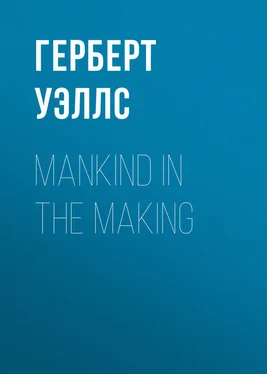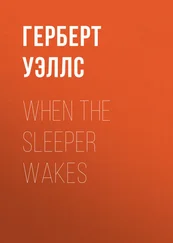Герберт Уэллс - Mankind in the Making
Здесь есть возможность читать онлайн «Герберт Уэллс - Mankind in the Making» — ознакомительный отрывок электронной книги совершенно бесплатно, а после прочтения отрывка купить полную версию. В некоторых случаях можно слушать аудио, скачать через торрент в формате fb2 и присутствует краткое содержание. Жанр: Философия, foreign_prose, на английском языке. Описание произведения, (предисловие) а так же отзывы посетителей доступны на портале библиотеки ЛибКат.
- Название:Mankind in the Making
- Автор:
- Жанр:
- Год:неизвестен
- ISBN:нет данных
- Рейтинг книги:4 / 5. Голосов: 1
-
Избранное:Добавить в избранное
- Отзывы:
-
Ваша оценка:
- 80
- 1
- 2
- 3
- 4
- 5
Mankind in the Making: краткое содержание, описание и аннотация
Предлагаем к чтению аннотацию, описание, краткое содержание или предисловие (зависит от того, что написал сам автор книги «Mankind in the Making»). Если вы не нашли необходимую информацию о книге — напишите в комментариях, мы постараемся отыскать её.
Mankind in the Making — читать онлайн ознакомительный отрывок
Ниже представлен текст книги, разбитый по страницам. Система сохранения места последней прочитанной страницы, позволяет с удобством читать онлайн бесплатно книгу «Mankind in the Making», без необходимости каждый раз заново искать на чём Вы остановились. Поставьте закладку, и сможете в любой момент перейти на страницу, на которой закончили чтение.
Интервал:
Закладка:
The very existence and nature of man is an interference with Nature and Nature’s ways, using Nature in this sense of the repudiation of expedients. Man is the tool-using animal, the word-using animal, the animal of artifice and reason, and the only possible “return to Nature” for him – if we scrutinize the phrase – would be a return to the scratching, promiscuous, arboreal simian. To rebel against instinct, to rebel against limitation, to evade, to trip up, and at last to close with and grapple and conquer the forces that dominate him, is the fundamental being of man. And from the very outset of his existence, from the instant of his birth, if the best possible thing is to be made of him, wise contrivance must surround him. The soft, new, living thing must be watched for every sign of discomfort, it must be weighed and measured, it must be thought about, it must be talked to and sung to, skilfully and properly, and presently it must be given things to see and handle that the stirring germ of its mind may not go unsatisfied. From the very beginning, if we are to do our best for a child, there must be forethought and knowledge quite beyond the limit of instinct’s poor equipment.
Now, for a child to have all these needs supplied implies certain other conditions. The constant loving attention is to be got only from a mother or from some well-affected girl or woman. It is not a thing to be hired for money, nor contrivable on any wholesale plan. Possibly there may be ways of cherishing and nursing infants by wholesale that will keep them alive, but at best these are second best ways, and we are seeking the best possible. A very noble, exceptionally loving and quite indefatigable woman might conceivably direct the development of three or four little children from their birth onward, or, with very good assistance, even of six or seven at a time, as well as a good mother could do for one, but it would be a very rare and wonderful thing. We must put that aside as an exceptional thing, quite impossible to provide when it is most needed, and we must fall back upon the fact that the child must have a mother or nurse – and it must have that attendant exclusively to itself for the first year or so of life. The mother or nurse must be in health, physically and morally, well fed and contented, and able to give her attention mainly, if not entirely, to the little child. The child must lie warmly in a well-ventilated room, with some one availably in hearing day and night, there must be plentiful warm water to wash it, plenty of wrappings and towellings and so forth for it; it is best to take it often into the open air, and for this, under urban or suburban conditions at any rate, a perambulator is almost necessary. The room must be clean and brightly lit, and prettily and interestingly coloured if we are to get the best results. These things imply a certain standard of prosperity in the circumstances of the child’s birth. Either the child must be fed in the best way from a mother in health and abundance, or if it is to be bottle fed, there must be the most elaborate provision for sterilizing and warming the milk, and adjusting its composition to the changing powers of the child’s assimilation. These conditions imply a house of a certain standard of comfort and equipment, and it is manifest the mother cannot be earning her own living before and about the time of the child’s birth, nor, unless she is going to employ a highly skilled, trustworthy, and probably expensive person as nurse, for some year or so after it. She or the nurse must be of a certain standard of intelligence and education, trained to be observant and keep her temper, and she must speak her language with a good, clear accent. Moreover, behind the mother and readily available, must be a highly-skilled medical man.
Not to have these things means a handicap. Not to have that very watchful feeding and attention at first means a loss of nutrition, a retarding of growth, that will either never be recovered or will be recovered later at the expense of mental development or physical strength. The early handicap may also involve a derangement of the digestion, a liability to stomachic and other troubles, that may last throughout life. Not to have the singing and talking, and the varied interest of coloured objects and toys, means a falling away from the best mental development, and a taciturn nurse, or a nurse with a base accent, means backwardness and needless difficulty with the beginning of speech. Not to be born within reach of abundant changes of clothing and abundant water, means – however industrious and cleanly the instincts of nurse and mother – a lack of the highest possible cleanliness and a lack of health and vitality. And the absence of highly-skilled medical advice, or the attentions of over-worked and under-qualified practitioners, may convert a transitory crisis or a passing ailment into permanent injury or fatal disorder.
It is very doubtful if these most favourable conditions fall to the lot of more than a quarter of the children born to-day even in England, where infant mortality is at its lowest. The rest start handicapped. They start handicapped, and fail to reach their highest possible development. They are born of mothers preoccupied by the necessity of earning a living or by vain occupations, or already battered and exhausted by immoderate child-bearing; they are born into insanity and ugly or inconvenient homes, their mothers or nurses are ignorant and incapable, there is insufficient food or incompetent advice, there is, if they are town children, nothing for their lungs but vitiated air, and there is not enough sunlight for them. And accordingly they fall away at the very outset from what they might be, and for the most part they never recover their lost start.
Just what this handicap amounts to, so far as it works out in physical consequences, is to be gauged by certain almost classical figures, which I have here ventured to present again in graphic form. These figures do not present our total failure, they merely show how far the less fortunate section of the community falls short of the more fortunate. They are taken from Clifford Allbutt’s System of Medicine (art. “Hygiene of Youth,” Dr. Clement Dukes). 15,564 boys and young men were measured and weighed to get these figures. The black columns indicate the weight (+9 lbs. of clothes) and height respectively of youths of the town artisan population, for the various ages from ten to twenty-five indicated at the heads of the columns. The white additions to these columns indicate the additional weight and height of the more favoured classes at the same ages. Public school-boys, naval and military cadets, medical and university students, were taken to represent the more favoured classes. It will be noted that while the growth in height of the lower class boy falls short from the very earliest years, the strain of the adolescent period tells upon his weight, and no doubt upon his general stamina, most conspicuously. These figures, it must be borne in mind, deal with the living members of each class at the ages given. The mortality, however, in the black or lower class is probably far higher than in the upper class year by year, and if this could be allowed for it would greatly increase the apparent failure of the lower class. And these matters of height and weight are only coarse material deficiencies. They serve to suggest, but they do not serve to gauge, the far graver and sadder loss, the invisible and immeasurable loss through mental and moral qualities undeveloped, through activities warped and crippled and vitality and courage lowered.
Moreover, defective as are these urban artisans, they are, after all, much more “picked” than the youth of the upper classes. They are survivors of a much more stringent process of selection than goes on amidst the more hygienic upper and middle-class conditions. The opposite three columns represent the mortality of children under five in Rutlandshire, where it is lowest, in the year 1900, in Dorsetshire, a reasonably good county, and in Lancashire, the worst in England, for the same year. Each entire column represents 1,000 births, and the blackened portion represents the proportion of that 1,000 dead before the fifth birthday. Now, unless we are going to assume that the children born in Lancashire are inherently weaker than the children born in Rutland or Dorset – and there is not the shadow of a reason why we should believe that – we must suppose that at least 161 children out of every 1,000 in Lancashire were killed by the conditions into which they were born. That excess of blackness in the third column over that in the first represents a holocaust of children, that goes on year by year, a perennial massacre of the innocents, out of which no political capital can be made, and which is accordingly outside the sphere of practical politics altogether as things are at present. The same men who spouted infinite mischief because a totally unforeseen and unavoidable epidemic of measles killed some thousands of children in South Africa, who, for some idiotic or wicked vote-catching purpose, attempted to turn that epidemic to the permanent embitterment of Dutch and English, these same men allow thousands and thousands of avoidable deaths of English children close at hand to pass absolutely unnoticed. The fact that more than 21,000 little children died needlessly in Lancashire in that very same year means nothing to them at all. It cannot be used to embitter race against race, and to hamper that process of world unification which it is their pious purpose to delay.
Читать дальшеИнтервал:
Закладка:
Похожие книги на «Mankind in the Making»
Представляем Вашему вниманию похожие книги на «Mankind in the Making» списком для выбора. Мы отобрали схожую по названию и смыслу литературу в надежде предоставить читателям больше вариантов отыскать новые, интересные, ещё непрочитанные произведения.
Обсуждение, отзывы о книге «Mankind in the Making» и просто собственные мнения читателей. Оставьте ваши комментарии, напишите, что Вы думаете о произведении, его смысле или главных героях. Укажите что конкретно понравилось, а что нет, и почему Вы так считаете.












